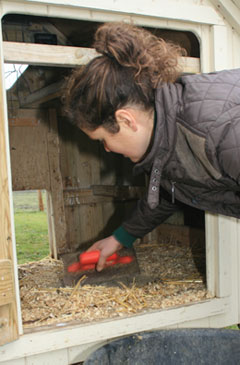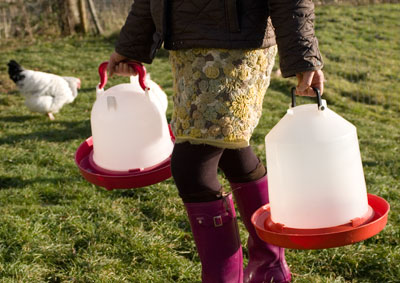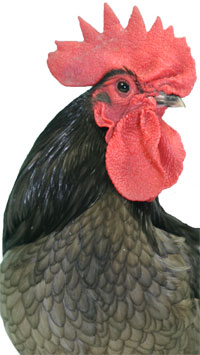Stress is a major contributor to ill health in chickens and can also make them more prone to a number of vices such as feather picking, egg eating, comb or vent pecking.
Chickens kept in intensive conditions are constantly subjected to stress which is why farmers see such high mortality rates and have to pay out to keep birds healthy and make them productive. Fortunately, keeping chickens in our back garden isn’t exactly intensive as long as they have a sufficiently large run or are let out of their run regularly to free-range although there are pleanty of other times when chickens can suffer from stress.
In short, stress is best avoided whenever possible and a little bit of care and forethought can dramatically reduce stress in your birds.
So how do we know what stresses chickens? Well, some years ago, there were studies done that measured the stress hormone ‘corticosterone’ of birds in different situations and it is this research that has enabled us to understand the stressors.
Stressors.
As well as intensive conditions causing stress, the other main stressors can seem quite trivial to us.
- Handling. This is one of the biggest stressors. Chickens are a prey species so naturally, if caught and picked up, they become stressed. Whilst regular handling is important for health checks, chasing a bird around a run for 5 minutes every time will not help. Try to catch birds in a confined area such as a house quickly and calmly. Hold the wings firmly and then transfer the bird to the holding position with your right hand underneath her, breast in the palm of your hand, fingers holding the tops of the legs. Her head should be underneath your arm so her head is looking behind you. Use your left hand to examine her.
- Introducing new chickens. Chickens are flock animals that have a pecking order. It is thought the ancestors to our chickens, the Red Jungle Fowl of South East Asia use the pecking order to assist in their survival. If every bird has her place, when it comes to feeding time, each one can have her turn and they don’t have to spend precious time arguing which may alert predators to their where-abouts. Every hen knows her place in the pecking order and by introducing new birds, the pecking order is upset. No hen knows where she stands and this will cause arguments and considerable stress for days until they have sorted themselves out into a ‘new flock’.
- Lack of food or water. This stress is completely avoidable of course but we all have those one off days when we suddenly realise that our birds have run out of water for one reason or another. A leaky water container, frozen water or just a forgetful moment!
- Extreme heat. Chickens don’t sweat. To cool down, a chicken must either take on cool water (and excrete more to lose the excess fluids and some heat) or pant which removes heat through the air they exhale. Chickens are much better equipped to deal with the cold and can keep their body temperature up by eating more and trapping air inside their feathers to insulate themselves thermally. Heat will cause chickens to become stressed.
- A new environment. This can be taking a bird to a show, getting your birds for the first time or just moving them to a different house or run. Another environmental change that is hard to avoid but causes considerable stress for your birds is when there has been a covering of snow.
- Egg laying. This is surprising since this is a natural things that chickens do but egg laying does cause stress on your hens. Giving them a peaceful, private, darkened nest box can help. Try not to disturb hens that are in the process of laying.
- Predation. Foxes or other predators visiting the garden on a regular basis are likely to cause stress. In the extreme case, after a fox attack, even though a chicken may survive the wounds inflicted by a fox (he grabs a mouth full of her feathers for example and the chicken escapes), she can still die because of the stress.

If you can minimise stress, your birds will be less prone to picking up disease which is something we would all like: happy, healthy chickens!






I am having problems with my chickens who have started pecking each other. I have had them a month and all seemed well with one laying. This week the 2 heritage skylines have been pecked badly with blood drawn. I have treated and coloured the areas, separated the prime suspect pecker, but another rhode ranger was pecked, back to the drawing board. They have a couple of hours ranging the garden everyday but the skylines in particular pace alot waiting to get out, I hang greens up, there are 6 in a 6’x9′ run with a large raised coop. It is complicated further as they are now starting to lay and need access to the nest box and once a few feathers are ruffled they all seem to peck. Help needed with stopping the peckin; do I need another nest box for the separate run? are skylines really okay mixed in with rhode rangers and silver stars? have I given them too much freedom and they are now bored? How can I get back on an even keel. Is this usual as they start laying?
Normally, once the pecking order is established, they should settle down, however sometimes they can be nasty to one another and space to avoid one another becomes more important. They are in fairly close proximity in the run so I would try to give them a larger area. This will allow them space, but also give them more to do and explore. I would ensure there are 2 feeders and 2 water containers during this time so there are no conflict points. They are normally compatible if they are all a similar size. Occassionally, there are birds that will never get along and if this fails, I would try to single out the peckers and see if the flock works better without them.
Thank you so much for your advice. Have let the skylines free range during the day, then they all get together for a few hours in the garden and its fine. Am making adjustments to the run and taken on board suggestions to keep them busy with extra veg hanging up. The pecking started when they all went crazy for one melon hanging up. Will put into one flock again once space issue sorted. Your website is great and I really appreciate your advice – so do the chooks as they are much happier.
Hi, this is a great site!
We have recently introduced two laying hens with two new non-laying teens. At first, I thought they were accepting each other. But boy, was I a fool. One of the older hens has all but stopped laying. She has also grown fat. The two older hens pick on the younger hens badly, controlling their whereabout and attacking them.
It’s only been a few weeks. Is it a good idea to separate them again? Should I put them into separate pens at night? Should I allow them separate times for ranging? How do I reintroduce them? Your input is very much appreciated.
Hen stress causes human stress!
As the youngsters get bigger, they -should- start to be able to look after themselves more.
If there is no blood being drawn, I wouldn’t separate them. Give them as much space as you can and provide more than one feeder and drinker to make this easier for the younger hens. Look at their diet. Fat hens don’t lay eggs, see my page on feeding for more information here…
hi we have had 5 chickens now for 9 months yesterday we found the white one dead on the floor in the coop the neighbour said they herd one chicken screaming about half eleven the night before we,ve treated the pen as we did have red mite we treated the birds and the pen would the mites cause her to scream out or do you think something frightend her the partner to her was cureld up in the corner and would,nt come out she,s fine now but has stopped laying since we lost her partner we have cleared the mite problem up we had new pen but we just want to know if you could tell us what you think has killed the bird
many thanks
It would be a predator that worried the birds. There wouldn’t be any noises caused by the red mite.
hi
ive had x bats for about 8 weeks and ive noticed this morning that one is bleeding from her vent, would this be pecking as you mention in “stress” or prhaps being egg bound ?
It could be, or a prolapse that has been pecked but also other internal problems. If she has passed a particularly big egg, it can cause her to bleed a little. Keep an eye on her and take her to the vets if it doesn’t stop or she goes downhill.
hi all just got 3 pol s one is laying soft shells what can i buy as a suppyment
You can make sure the diet is correct (see my page on feeding) as there is sufficient calcium in modern feeds, and you can ensure there is Oystershell grit available but normally soft eggs are only temporary. Longer term problems can appear from time to time and can be more to do with the ability to absorb calcium rather than a lack of it.